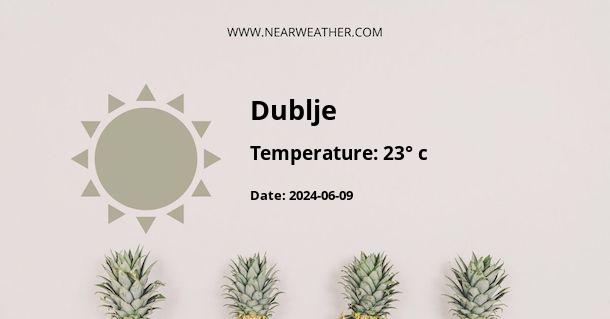Understanding the Climate and Weather Patterns of Dublje, RS
The small village of Dublje is situated in the province of Vojvodina, within the Republic of Serbia. Understanding the climate of Dublje requires an in-depth look at the continental climate that dominates this region, characterized by hot summers and cold winters. Let's delve into the various aspects of Dublje’s climate and its weather patterns that span across the different seasons of the year.
Geographical Influence on Dublje’s Climate
The climate of Dublje is significantly influenced by its geographic position in the Pannonian Plain. This flat terrain allows for the free movement of air masses, which can contribute to more extreme weather patterns.
Annual Weather Overview
In a general sense, Dublje experiences a temperate continental climate. This is marked by four distinct seasons — spring, summer, autumn, and winter. Here, we will review each season's climate characteristics.
Spring
Spring in Dublje is a transition period from the cold winter to the warmer summer. It is characterized by gradually increasing temperatures and more precipitation.
- March brings the end of the winter chill, although temperatures can still be quite variable.
- April sees a noticeable warming trend, with more consistent rainfall.
- May is significantly warmer, and it's when the spring truly manifests with lush greenery.
Spring temperatures can range from highs of around 18°C (64°F) in March to highs of around 25°C (77°F) in May.
Summer
Summer is the warmest season in Dublje, with long, sunny days. The weather is typically hot and sometimes can lead to drought conditions.
- June marks the beginning of summer with comfortable warm weather.
- July and August bring peak temperatures that can reach above 30°C (86°F).
- Summers tend to be the driest part of the year, although occasional thunderstorms can occur.
During the summer months, it is not uncommon for temperatures to exceed 35°C (95°F), especially during heatwaves.
Autumn
Autumn in Dublje sees a gradual drop in temperatures and an increase in precipitation. The landscape becomes dotted with the colors of fall foliage.
- September still enjoys the warmth of summer, but the temperatures start to cool.
- October is cooler still, with an increased chance of frost towards the end of the month.
- By November, the weather turns much chillier, signaling the onset of winter.
Daytime highs can range from 20°C (68°F) in September to around 10°C (50°F) by November.
Winter
Winter in Dublje is cold and can be quite harsh, with snowfall and frost being common.
- December sees the beginning of winter with shorter days and dropping temperatures.
- January is often the coldest month, with temperatures frequently below freezing.
- February begins the slow transition back into spring, though cold snaps can still occur.
Temperatures in winter can fall as low as -10°C (14°F) during cold spells but generally hover around or just below freezing.
Precipitation and Humidity
Throughout the year, Dublje receives an average amount of precipitation. The wettest part of the year is generally late spring into early summer, with drier conditions prevailing in the winter months, with the exception of snowfall.
Average Annual Precipitation: 600 mm
Highest Rainfall Months: May and June
Driest Months: January and February
Relative humidity in Dublje is fairly high, reflecting its inland position and continental climate.
Average Annual Humidity: 80%
Highest Humidity Months: December and January
Lowest Humidity Months: August and September
Wind and Air Quality
The wind can play a significant role in Dublje's weather, with breezes originating from the north and northwest, known locally as the Košava wind. This wind is most common in the autumn and winter months and can lead to sudden drops in temperature.
As a rural village, Dublje enjoys relatively good air quality throughout the year, with lower levels of pollution compared to urban centers.
Long-term Climate Challenges
As with many regions around the world, Dublje faces challenges associated with climate change. Increased temperatures and altered precipitation patterns can affect agriculture, which is an essential part of the local economy.
Expert Opinions and Research
Climate experts project that if the current trends in global warming continue, villages like Dublje could experience more extreme weather events, including heatwaves and severe storms. As such, preparedness and adaptation strategies are critical for the region.
Seasonal Tips for Visitors
- Spring: Pack layers to accommodate fluctuating temperatures.
- Summer: Bring light clothing, sunscreen, and plenty of water to stay hydrated.
- Autumn: Enjoy the fall colors, but remember to have warm clothing as the weather cools.
- Winter: Prepare for cold weather with heavy jackets, gloves, and hats.
Conclusion
Understanding the climate and weather in Dublje is crucial for locals and visitors alike. Whether planning agricultural activities, considering long-term climate resilience, or simply preparing for a trip, a comprehensive knowledge of weather patterns and seasonal variations is invaluable.
By observing trends, engaging with expert research, and staying informed about potential shifts in climate, residents, and visitors of Dublje can better appreciate and adapt to the beautiful yet dynamic continental climate of this Serbian village.
A - Dublje's Latitude is 44.800560 & Longitude is 19.508060.
A - Weather in Dublje is 3° today.
A - Climate Conditions in Dublje shows overcast clouds today.
A - Humidity in Dublje is 73% today.
A - Wind speed in Dublje is 9.36 km/h, flowing at 257° wind direction. today.
